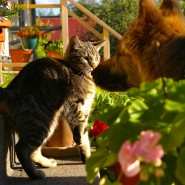
AS spring flowers bloom in forests, parks and gardens across Dorset, pet owners are being warned of the dangers certain plants bring to cats and dogs.
While colourful springtime flora such as daffodils, tulips and lilies are delightful to look at, they can also prove deadly to pets.
According to findings from More Than, over three quarters (78%) of Britain’s gardens contain plants that are toxic to cats and dogs. The insurance provider also found almost 10 per cent of cats and dogs have fallen ill after ingesting dangerous plant life. Of those, 43 per cent subsequently needed urgent veterinary care, while 15 per cent sadly passed away.
Among the popular spring plants and flowers that can be dangerous to pets are daffodils, tulips, lilies, crocuses and lily of the valley.
With daffodils, ingestion of the bulb, plant or flower can cause severe vomiting, diarrhoea, abdominal pain, and even possible cardiac problems in dogs and cats. The main toxicity of tulips is found in the bulbs, and when ingested it can result in irritation to the mouth and oesophagus. Typical signs of poisoning include drooling, vomiting and diarrhoea.
There are many varieties of lily and not all are dangerous to pets. Peace and Calla lily can cause minor complications when ingested, such as irritation to the mouth. However, the likes of Tiger, Asiatic and Easter lilies can be highly toxic to cats, with the ingestion of even small amounts of the plant potentially resulting in kidney failure.
The spring crocus variety can cause general gastrointestinal upset including vomiting and diarrhoea. And the lily of the valley plant can cause symptoms similar to foxglove when ingested by pets, including vomiting, erratic heart rate and diarrhoea.
Despite the dangers, More Than found one in three pet owners (31%) admitted they had no idea if the plants in their garden were toxic. The same number were unaware plants could be poisonous to pets.
As part of its campaign, More Than is calling on plant producers, manufacturers of garden products and retailers to provide clearer labelling to help pet owners easily identify if plants are safe or harmful to cats and dogs. To date, over 30 MPs have supported the company’s aims for clearer labelling.
George Lewis, head of marketing, said: “Whether you’re walking your dog in the park or planting bulbs in the garden, we would urge pet owners everywhere to take the appropriate steps to ensure their cats and dogs are safe.” from ingesting poisonous spring plant life and falling seriously ill.”